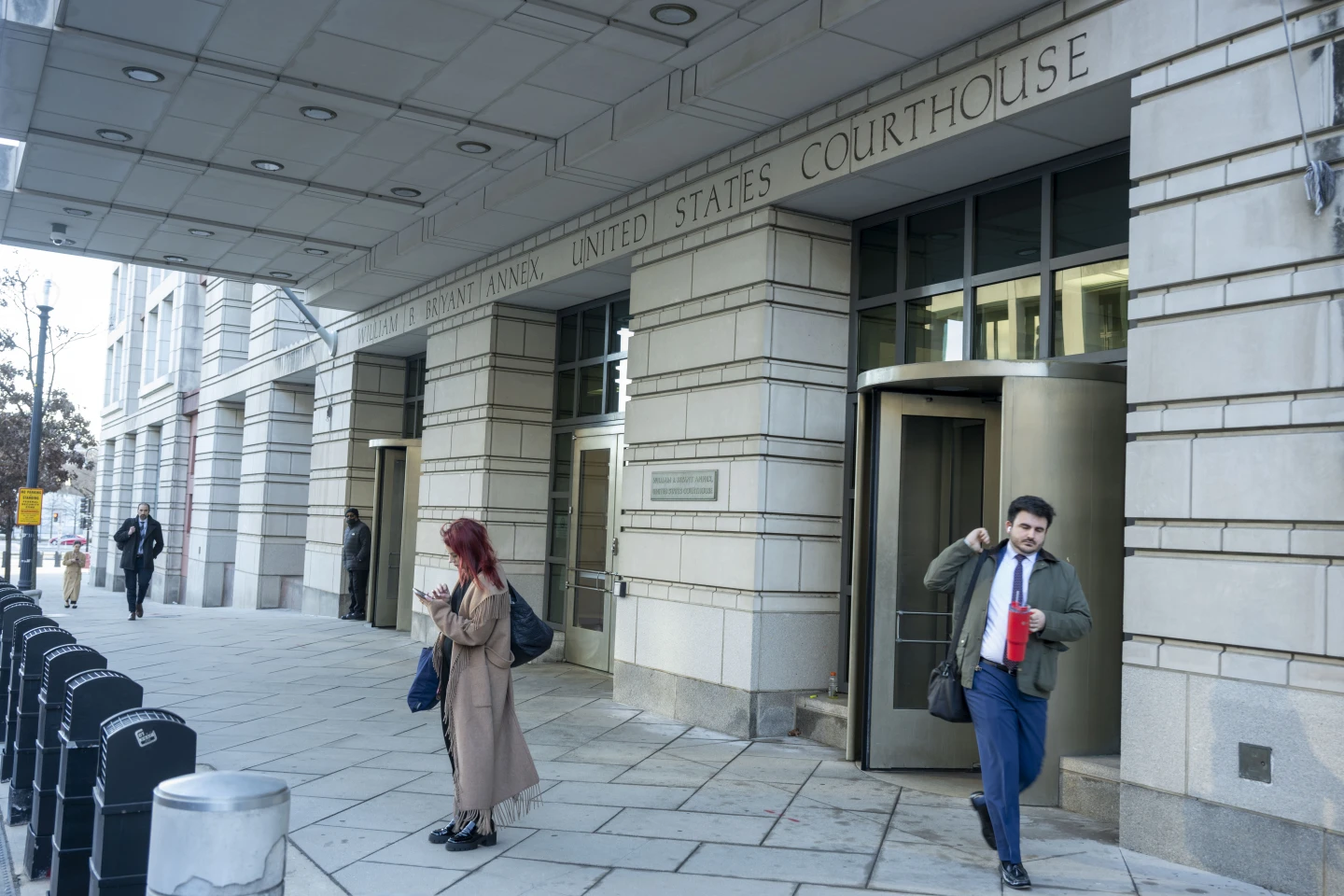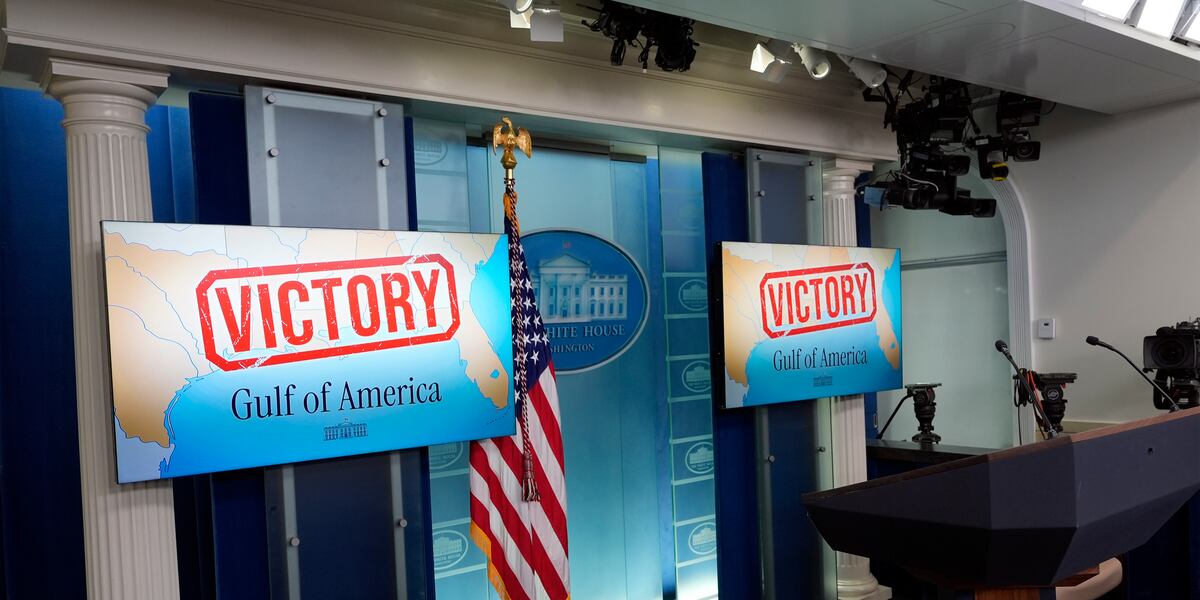Breaking: Judge Denies AP White House Access In Gulf Of Mexico Dispute
Is the First Amendment under siege? A recent court ruling in Washington, D.C., concerning the Associated Press (AP) and its access to the White House suggests a complex interplay between journalistic freedom, governmental authority, and the very language we use to define our world.
On Monday, a federal judge in Washington, D.C., declined to immediately restore the AP's access to the White House press pool. This decision stems from a dispute that began with the Trump administration's efforts to rename the Gulf of Mexico as the "Gulf of America," a designation the AP refused to adopt in its reporting. This refusal, according to the AP, led to the agency being unconstitutionally punished, specifically through restrictions on its access to presidential events and travel. The judge's ruling, however, did not entirely shut the door on the APs case. While immediate restoration of access was denied, the court urged the government to reconsider its stance. The implications of this decision extend beyond the immediate dispute, touching upon fundamental principles of press freedom and the role of the media in a democratic society. The case highlights the tension between the government's desire to control the narrative and the press's duty to report the news objectively and without fear of reprisal.
The heart of the matter lies in the judge's interpretation of the harm caused by the restrictions. The judge, District Judge Trevor McFadden, asserted that there was no evidence of irreparable harm caused by the AP's lack of access. This absence of immediate harm weighed heavily in the decision not to immediately restore access. However, the judge's urging the government to reconsider implies a recognition of the potential for long-term damage to the press's ability to fulfill its role. The case is a reflection of the broader challenges faced by journalists in an era of political polarization and evolving definitions of truth. The denial of immediate relief, while significant, also serves as a call for further deliberation on the delicate balance between governmental power and the freedom of the press.
The legal arguments in the case center on the First Amendment, which guarantees freedom of the press. The APs claim is that restricting its access to White House events constitutes a violation of this right. The government, on the other hand, likely argues that its actions are within its prerogative to manage its own events and that the restrictions are not a violation of the First Amendment but a reasonable exercise of its authority. The judge's decision to deny immediate restoration of access means the legal battle continues. The AP, represented by its legal counsel, is now faced with the task of proving the harm caused by the restrictions, making a compelling case for the restoration of its access. The government, meanwhile, has the opportunity to re-evaluate its position and possibly seek an outcome that protects both its interests and the press's freedom.
This case, while rooted in a dispute over the renaming of a geographical feature, opens up an examination of the influence of language itself. The Trump administrations push to rename the Gulf of Mexico as the "Gulf of America" raises questions about the symbolic power of names and how they can be used to shape national identity and political discourse. The AP's refusal to adopt this new designation highlights the journalistic principle of adhering to established, objective terminology. This refusal became the central point of contention, prompting the governments response, which led to the restrictions on the APs access. The outcome of this case has the potential to set a precedent for how future administrations interact with the press and how much power they have to influence media coverage. The legal arguments made on both sides will likely be relevant to the interpretation of the First Amendment in future cases involving press access to government events and information.
The repercussions of this legal dispute extend beyond the immediate participants. The case will be closely watched by media organizations, legal scholars, and civil liberties advocates. It is a test of the press's ability to hold power accountable and a challenge to the governments authority to control the flow of information. The final outcome will significantly influence future interactions between the press and the government. It might set a precedent for how the press can challenge restrictions on access and what remedies are available to them when their rights are violated. Furthermore, the case emphasizes the importance of independent journalism in providing the public with reliable and unbiased information.
The judges ruling is a reminder of the dynamic nature of constitutional rights. The rights guaranteed by the First Amendment are not static; they are continuously being tested and reinterpreted in the context of contemporary events. The specifics of this case a dispute over geographical terminology and press access to the White House add a contemporary angle to the ongoing debate about the First Amendment. The intersection of language, political power, and journalistic freedom makes this case particularly noteworthy and will influence the relationship between the press and the government for years to come.
The central question that arises is this: can the government, through its control of access, effectively dictate the terms of the media's reporting? The APs argument that restricting its access is a form of punishment is at the heart of the case. The governments response to the renaming issue created a situation where the AP, as an organization committed to journalistic integrity, was put in a difficult position. The case therefore touches upon the fundamental principles of journalistic ethics and the rights of journalists to report without fear of retribution.
The fact that the judge, while denying immediate relief, urged the government to reconsider their position suggests that the court acknowledges the complexities of the situation. The judge's actions indicate a commitment to upholding press freedom, yet also recognize the governments authority. The court is seeking a balance. The resolution will provide valuable clarity on the limits of governmental power over the press. It is the outcome of the case that will influence how media organizations cover the government in the future. Its a test case for press freedom and it is a test for how the government interacts with media organizations.
The significance of this legal challenge is heightened by the current climate of political polarization. In an environment where trust in the media is eroding, any action that challenges press freedom is likely to be scrutinized. The case is a reflection of the broader challenges facing journalism in the 21st century, including the spread of misinformation, the increasing pressures on media organizations, and the government's role in regulating the flow of information. The outcome is anticipated to shape the legal landscape for future clashes between the press and the government. It also poses questions about the long-term viability of an independent press and its ability to fulfill its crucial role in a democratic society.
In essence, the legal battle between the AP and the Trump administration concerning press access transcends a singular matter of geography. It is part of a more significant conversation about press freedom and governmental authority. The courts ruling, although not immediately resolving the issue, sets the stage for a continued analysis of these central issues. The case has the potential to shape the legal landscape for years to come, and the outcome will influence the way journalists cover the government and the way the government engages with the press.
The events in this article are from a specific period and context, the Trump administration, with a focus on the Trump Administration's actions and the AP's response. The judge's decision becomes particularly interesting. The legal proceedings are essential for understanding the complexities of freedom of the press and the importance of independent journalism. The final result will have a bearing on how future administrations interact with the press and the rights of journalists to report without fear of retribution.
| Category | Details |
|---|---|
| Date of Ruling | Monday [Insert Date Here - i.e., January 1, 2024] |
| Location | Washington, D.C. |
| Judge | District Judge Trevor McFadden |
| Defendant | Trump Administration (represented by relevant government officials) |
| Plaintiff | Associated Press (AP) |
| Issue | Restrictions on AP's access to White House events and travel due to refusal to use "Gulf of America" |
| Ruling | Denied immediate order to restore AP's access but urged the government to reconsider. |
| Legal Basis | First Amendment (Freedom of the Press) |
| Key Argument (AP) | Restrictions constitute unconstitutional punishment. |
| Key Argument (Government - Implied) | Government has the right to manage its own events and the restrictions are a reasonable exercise of its authority. |
The decision's impact should not be underestimated, as it has the potential to significantly affect how the press reports on the government and the way government functions with the press in the years ahead. The judge's request for government reconsideration shows a comprehension of the situation's intricacies. The outcome of this case will have an impact on how future administrations engage with the press. This is a test for press freedom, a test to examine how the government interacts with media organizations.
Further research, legal opinions, and public conversations on the interaction of press freedom and governmental power are spurred by the court's ruling. It is an important precedent, showing that constitutional rights are not fixed. These issues will need further attention, legal opinions, and public discourse on the subject of the government's power and press freedom.


